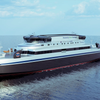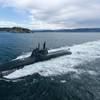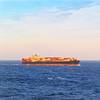Digital Change Over Effects EPIRBs
For the past year the television broadcasters have blanketed the airwaves advising the public that starting in February 2009 over-the-air television broadcasts will be going digital in the United States. This means that if you want to continue to receive free television reception, you must have a newer TV that has a digital tuner or you need to get a digital-to-analog converter box.
Not as well known but of substantial importance is that a critical piece of life-saving equipment will also be affected with a change from analog to digital transmissions - an Emergency Positioning Indicating Radio Beacon or EPIRB.
Starting in February 2009 the older beacons that transmit only an analog signal (121.5 or 243 MHz) will no longer be heard by search and rescue satellites. Just like checking a TV, boaters need to ensure that their distress beacon is capable of transmitting a digital signal (406 MHz) in order for it to be recognized.
Although recreational boaters are not required to carry an EPIRB, they are strongly recommended for all boaters, including kayaks and other paddle craft, along with a VHF‐FM marine band radio. The 406 MHz signal sent by the newer EPIRBs when a mariner encounters distress are picked up by the COSPAS/SARSAT satellite constellation, which determines the EPIRBs position through triangulation. EPIRBs with embedded GPS are even more helpful in quickly finding a distressed boater. With GPS coordinates, the position of distress is pinpointed almost immediately. Without GPS, it may take two or three satellite passes to come up with a good, triangulated position.
As long as the new 406 MHz beacon has been registered (which is required by law), search and rescue authorities can quickly confirm that the distress is real, who they are looking for, and a description of the vessel or aircraft. This means an effective search can be initiated even before a final distress location has been determined for non‐GPS EPIRBs. It also means that a false activation may be resolved with a phone call to the beacon owner, saving resources for actual distresses.
Registration is free and can be done on the internet at www.beaconregistration.noaa.gov or it can be mailed/faxed to NOAA by calling 1‐888‐212‐SAVE. Beacon registrations must be updated at least every two years or when information such as emergency contact phone numbers and other vital information changes. This registration information is only available to authorized search and rescue personnel













